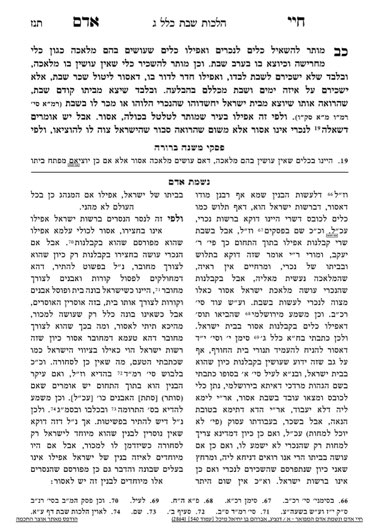We are beginning siman 22. The Chayei Adam moves away from the amira l’achum issues we have been discussing to discuss the issue of a Jew’s item being used on Shabbos by a non-Jew. Eventually, we will come to a concern of maris ayin of amira l’achum, but before discussing maris ayin, the question is whether there is an intrinsic issue with a Jew’s item being used on Shabbos for melacha.
The Gemara brings the opinion of Bais Shammai that the same way a Jew must rest on Shabbos, and a Jew’s animal must rest on Shabbos (unless it is sold to the non-Jew for Shabbos), there is a concept of shevisas keilim, that one’s items must rest as well. Bais Hillel disagrees, and holds there is no issur of shevisas keilim, but rather the issur is on the individual (and animals must rest as well, which are explicitly mentioned in the Torah) but not items.
We pasken in accordance with Bais Hillel. Therefore, the Chayei Adam writes it is muttar to lend items to a non-Jew before Shabbos, even though the Jew knows the non-Jew will use it on Shabbos. Similarly, it is muttar to rent an item to a non-Jew before Shabbos, even though the rental period includes Shabbos and the Jew will receive payment for its rental over Shabbos.
However, there is a concurrent issue of sechar Shabbos. For example, if a Jew owns a hotel, he cannot take payment for use of the hotel over Shabbos alone. The way contemporary hotels are set up, where Friday includes leil Shabbos and Saturday includes motzei Shabbos, it is muttar, because it is considered havla’ah. However, if a Yom Tov deoraysa occurs on Thursday Night/Friday, it would be problematic to receive payment for Friday, because there is no havla’ah. SImilarly, if a person were to charge specifically for Shabbos (i.e, sunset Friday until Motzei Shabbos), it would be a problem. They must make an arrangement in which payment for Shabbos is done through havla’ah.
The Chayei Adam adds that although we have discussed how it is muttar for a non-Jew to use a Jewish item over Shabbos, the non-Jew cannot take the Jewish item out of the Jew’s home on Shabbos itself. We are concerned that others will see the non-Jew carrying the item, and create chashad that the Jew is renting or selling the item to the non-Jew on Shabbos itself, which is an issue of business on Shabbos.
There is another opinion that the concern is if the non-Jew carries the item into an area which does not have an eruv, it will appear as though the Jew instructed the non-Jew to carry on Shabbos. If there is an eruv, this third concern will not apply, even though the first two (renting or selling) will still apply.
Summary
- A Jew can give or rent his items to a non-Jew for use over Shabbos. However, the non-Jew cannot take the items out of the Jew’s property on Shabbos itself, and any profits made by the Jew must be received through havla’ah.



